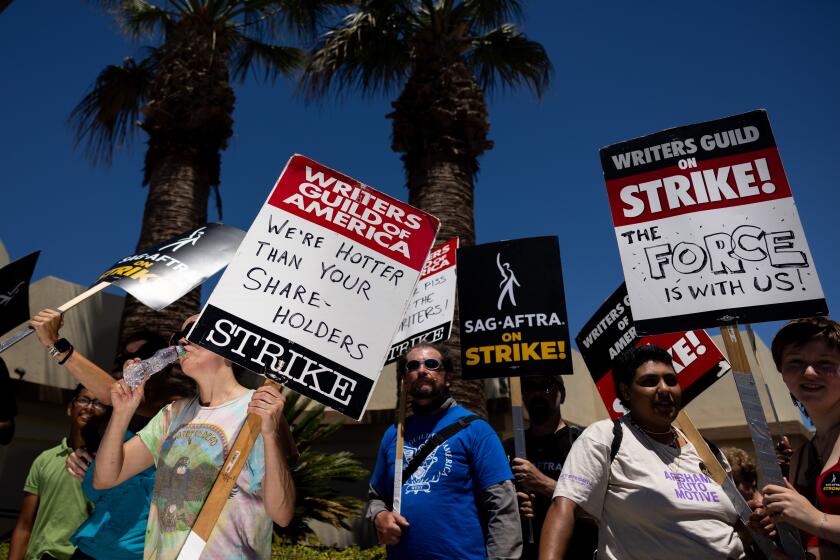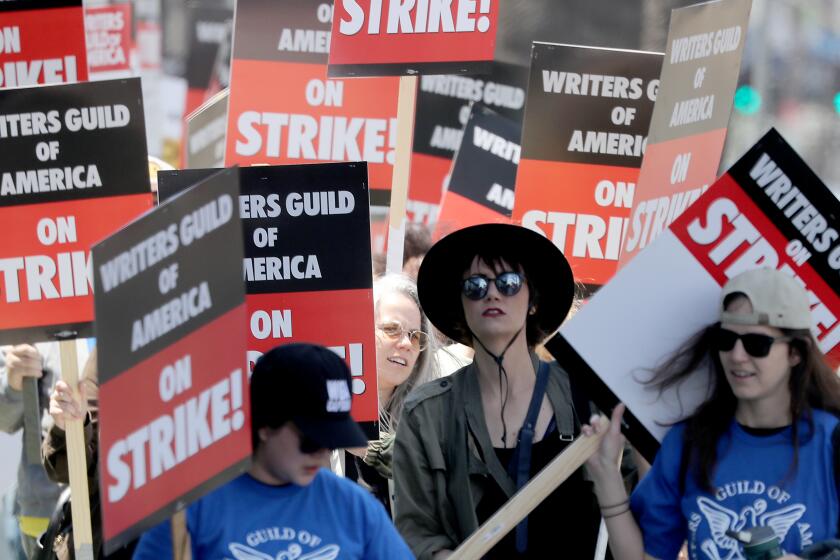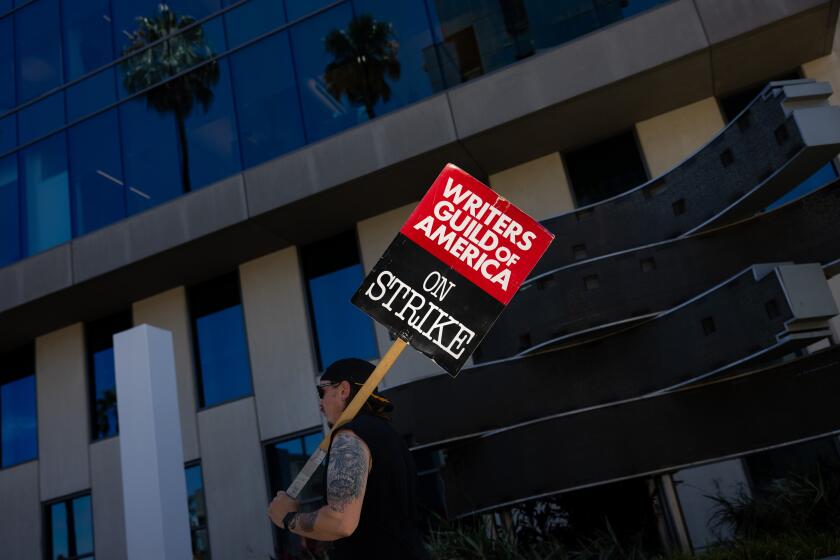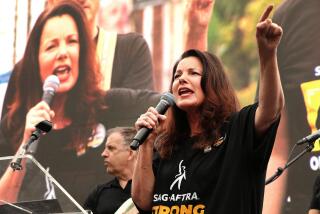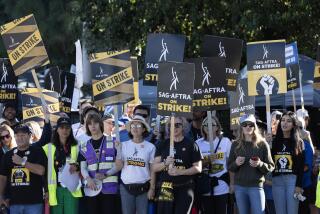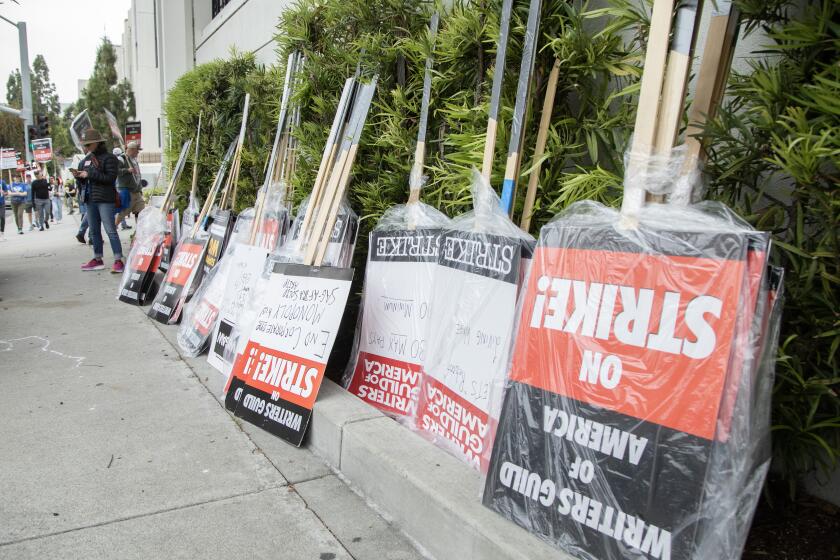The studios went public with their WGA offer. Was it a mistake?
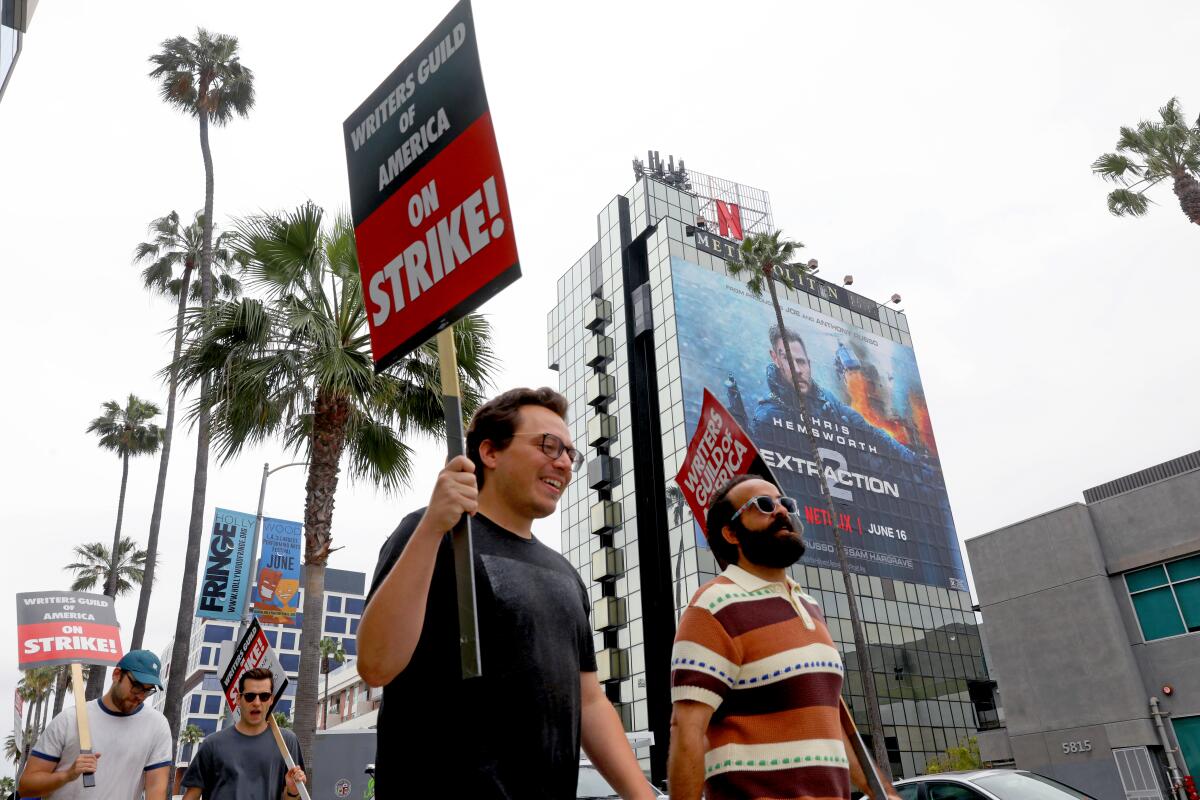
Signaling increasing frustration with the Writers Guild of America, Hollywood studios took the unusual step of publicizing their latest offer to the guild.
Late Tuesday, top studio executives met with WGAâs negotiators to encourage them to accept a deal that would end the 114-day WGA walkout, which has crippled film and television production. But after WGA leaders refused to bend, the studios made their deal points public â despite the usual practice of honoring a news blackout during negotiations.
The decision appeared aimed to force cracks in the resolve displayed by Hollywoodâs labor unions throughout the summer of strikes.
But the strategy seemed to have backfired, sparking a torrent of criticism from WGA members.
âThey made an enormous tactical error because they just made everybody mad,â prominent showrunner Mike Royce said Wednesday. âThey are trying to leapfrog over an important part of the deal-making process by going around our negotiating committee. This just raises red flags.â
The studiosâ gambit â and the hostile response it provoked â laid bare the bitterness and a lack of trust between the two sides, which prompted the walkout in early May and has stymied efforts to bring labor peace to Hollywood.
One legal expert said the decision by the Alliance of Motion Picture and Television Producers to release details of its offer could run afoul of laws governing collective bargaining. A National Labor Relations Board rule forbids management from circumventing union negotiators because both sides have a duty to negotiate in good faith.
âThey are trying to appeal to the union membership directly, which is a violation of the duty to bargain in good faith,â said Andrea Schneider, director of the Kukin Program for Conflict Resolution at the Cardozo School of Law in New York. âThis is not going to work. It hasnât worked in labor negotiations for 50 years.â
Screenwriters have been walking picket lines since May 2, and thereâs currently no end in sight. Actors also stopped work in mid-July, part of Los Angelesâ summer of labor strife.
Schneider said the tactic is known in legal circles as âBoulwarism,â a practice named after General Electric Co.âs chief negotiator, Lemuel Ricketts Boulware, who tried in the 1960s to force an agreement with the International Union of Electrical, Radio, and Machine Workers, as a âtake-it-or-leave itâ approach to negotiations.
A spokesperson for the AMPTP did not immediately comment on the criticism. People close to the studios said there was no formal agreement to a press blackout. One of the sources who was not authorized to speak publicly said the AMPTP had told guild leaders that they had planned to make the offer public.
The AMPTP on Tuesday said the offer provided âsignificantly higher compensation,â with the biggest wage boost to writers in 35 years.
People close to the studios who were not authorized to speak publicly also acknowledged the decision to make deal points public was designed to circumvent WGA leadership to spur writer-producers and legions of workers who are struggling financially to begin to apply pressure to WGAâs leadership to accept a deal.
The studios also wanted to publicly demonstrate that theyâre doing their part to try to hammer out a deal.
Tuesdayâs meeting â attended by Disney CEO Bob Iger, Netflix co-CEO Ted Sarandos, Warner Bros. Discovery CEO David Zaslav and NBCUniversal chief content officer Donna Langley as well as the AMPTP chief negotiator Carol Lombardini â was an effort to get industry titans in the room together with writers to facilitate a deal, according to two company insiders. Guild members have asked to talk to decision-makers, not just their labor negotiators.
The companies are under pressure to bring an end to the strikes, particularly after SAG-AFTRA launched its own strike in mid-July. The actorsâ strike has thrown studio movie and TV marketing campaigns into disarray.
Studio executives privately say the upcoming television season, the film and TV awards season â a financial engine for parts of the industry â along with film festivals and next yearâs movie slates are in jeopardy if a deal with the WGA isnât reached by mid-September.
They say failure to reach a deal by next month could significantly prolong the strike because some companies will give up on their fourth quarters and begin readjusting next yearâs film slates.
Lombardini, president of the AMPTP, said, âOur priority is to end the strike so that valued members of the creative community can return to what they do best and to end the hardships that so many people and businesses that service the industry are experiencing.â
The 2023 writersâ strike is over after the Writers Guild of America and the Alliance of Motion Picture and Television Producers reached a deal.
After the studios publicized their offer, the WGA blasted them in a statement released just before midnight Tuesday.
âOn the 113th day of the strike â and while SAG-AFTRA is walking the picket lines by our side â we were met with a lecture about how good their single and only counteroffer was,â the WGAâs negotiating committee said.
The WGA questioned the studio executivesâ motives.
âThis wasnât a meeting to make a deal. This was a meeting to get us to cave, which is why, not 20 minutes after we left the meeting, the AMPTP released its summary of their proposals,â the guild committee said. âThis was the companiesâ plan from the beginning â not to bargain, but to jam us. It is their only strategy â to bet that we will turn on each other.â
The strategy appears to follow the success the studios achieved during the 2007-2008 WGA strike, when the guild appeared less unified than today and prominent showrunners opened back-channels with studio executives to help secure a deal.
However, this year, showrunners who want to get their shows back up and running have largely stayed on the sidelines of negotiations and support for the leadership has been strong.
Social media has become an effective tool for the WGA and SAG-AFTRA, amplifying the passions on the picket lines. Members have portrayed company executives as greedy and out of touch with the realities of trying to make a living wage in Los Angeles and New York.
Despite some studio executives balking at WGAâs original demands, insiders say studios are now making concessions in a bid to end the strike. Will they be enough?
Studios have struggled to burnish their public image.
More Americans have been supportive of the actors and writers on strike compared to the studios, according to a recent poll conducted for The Times by Canadian-based polling firm Leger.
âMy sense is they believe that [releasing the proposal] might change the narrative,â said David Smith, professor of economics at the Pepperdine Graziadio Business School. âWhat theyâre trying to do is change the public perception of their role in the work stoppage.â
Stephen Galloway, dean of Chapman Universityâs film school, called the AMPTPâs statement a significant step to boost their public relations.
âThat says theyâve been hurting â otherwise they wouldnât be doing this,â Galloway said.
Some industry observers said that itâs unlikely the AMPTPâs proposal will fracture the unity of WGA members.
âThereâs always hope that you can start to sway a critical mass of a labor union, but my sense is that thereâs clear messages that these groups are pretty united within the ranks this time around,â Smith said.
âWeâre absolutely ready to picket as long as we need to,â said Eli Edelson, a TV writer and WGA captain, who joined others on the picket lines in Culver City outside Sony Pictures Entertainment. âThis is already the third-longest strike in our history. Weâre not going to picket this long to take a deal thatâs not as good as we deserve.â
Royce, the showrunner, questioned the studiosâ tactics.
âThey should have stayed quiet and kept with the negotiations, which is all weâre asking for,â Royce said. âBut instead, they are trying to jam this down our throats, and that made us all very angry because this is not a deal that we can take. But, hopefully this shouldnât mean that we are at an impasse. This should just be a dumb thing that they did on the way to deal.â
More to Read
Inside the business of entertainment
The Wide Shot brings you news, analysis and insights on everything from streaming wars to production â and what it all means for the future.
You may occasionally receive promotional content from the Los Angeles Times.
